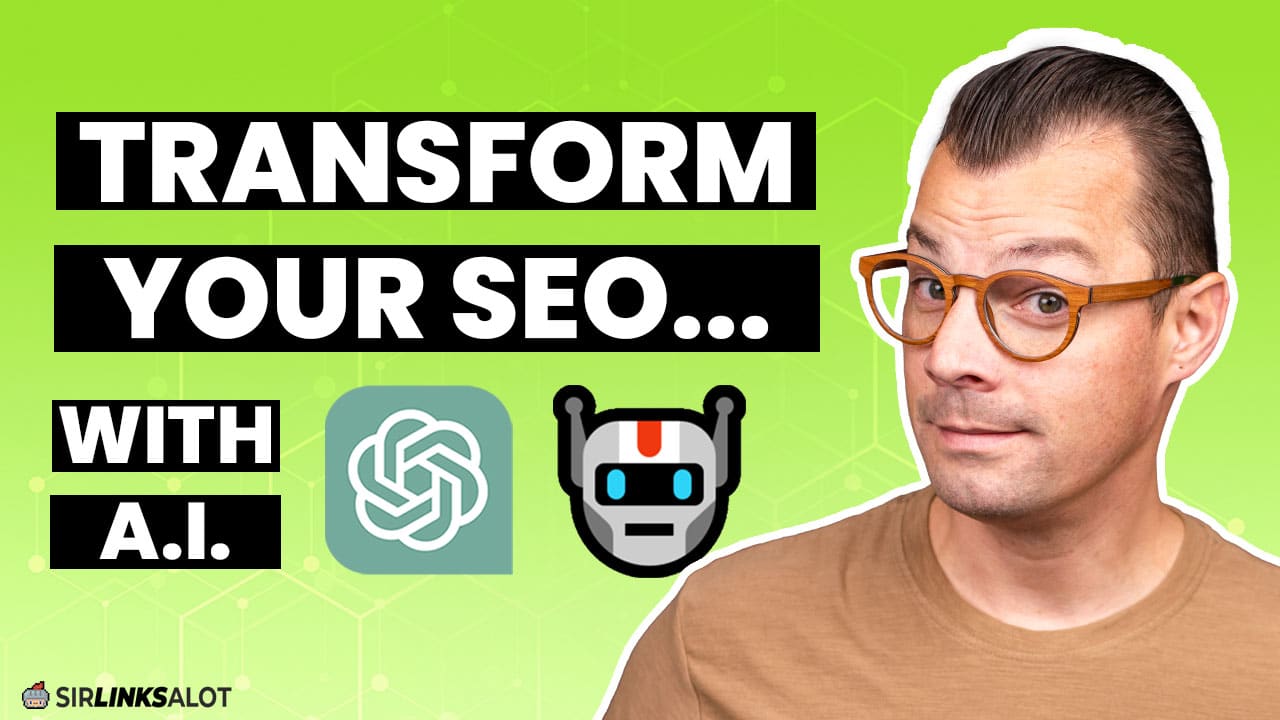
Adam Chronister is the founder of Enleaf, a US-based digital marketing agency. He has over a decade of experience in SEO, has been featured in publications such as The Wall Street Journal, has overseen the growth in company revenues to millions of dollars per month, has spoken at numerous SEO conferences, and has recently taken a keen interest in AI and applying it to his agency.
In this episode of SirLinksalot’s SEO Podcast, we talk to Adam in depth about all the ways he’s using AI to supplement the various aspects of the day-to-day operations of his marketing agency such as his custom content system, automated branded story guides, and more.
Think you’d be a great addition to our podcast, or have a request for someone to be featured? Head over to our podcast discovery page.
Watch the Podcast:
[embedded content]
Podcast Summary:
[01:33] What does the bulk of your day-to-day work involve?
It depends on the day. I’ve been focusing on AI for the last couple of weeks to help leverage agency tasks. My goal has been to conceptualize or create a new process or tool almost every day. The biggest thing that has propelled some of our processes is the ChatGPT for Sheets plugin, which allows you to pull ChatGPT into Google Sheets. It makes for a great test environment.
[12:54] Which SEO tools do you recommend?
Our main tool stack includes Screaming Frog, Semrush, and Surfer SEO.
[19:29] Can you walk us through your AI-facilitated content-creation system step-by-step?
We have a couple of different inputs: personal pronouns, tone of voice, H2 headers, and authorship. From there, we create an outline based on the top rankers, grabbing their heading text. We then write articles section-by-section. We organize everything into a key takeaways period of paragraphs.
[26:39] How do you grab the heading text? How has AI improved your process?
Before, we did it manually. We use a Chrome plugin that allows you to quickly grab the H2 headers off of a website. Today, we have Python do the crawl. Note that even the best AI content needs some level of editing. We have a full content team that is well-versed in AI. With our roughly 35-ish clients, we’ve been able to chop about a week-and-a-half off of our content creation process while increasing our content output (before, we created an average of three pieces of content per client).
[34:31] You don’t use AI detectors at all?
We’ve used them and tested them, but we haven’t used them on a daily basis. The more that I’ve tested different systems and read the documentation that Google has put out, I can see that there are a lot of inconsistencies between these different AI detectors. There are also academic articles saying that AI detection is mathematically impossible. Finally, Google itself has said that they “don’t care” how content is created.
[38:32] Why are some people getting their Adsense denied with Google saying they don’t have good content (i.e., it’s all AI-generated)?
I can’t speak for Adsense. I’d say that mechanism is a much smaller funnel to deal with. Everybody in the SEO industry that Google has had indexing issues for years. That’s for traditional web—before AI. Now you’re telling me Google is going to inject massive processing power to detect the entirety of the internet’s content with AI? It’s impossible just from a pure processing perspective. Could they come up with a penalty on a manual basis? Possibly. But when was the last time you got a manual penalty?
[45:35] You focus on quality over quantity, with an average of three articles per client per day. Do you experience any indexing issues with that approach?
We still have problems with indexing even though we’re not doing these mass-page affiliate websites. Even on smaller pages, we still see indexing issues. We don’t see any differences in the indexing of AI-written content versus manually-written content. As far as how to get stuff indexed, the first step is to use Google Search Console’s resubmission/re-indexation request. If we have trouble there, we’ll throw our social signals at links. It seems like that helps a lot as well. We have played around with third-party indexing services, but it seems like re-indexation requests and/or social signals typically do the trick.
[49:07] Tell us about your upcoming course on becoming a better prompt engineer.
I’m working on a course for Internet Marketing Gold (IMG) which is structured on the core process that will end up being part of our own internal tool. It starts with a process called “prompt hijacking”: There are pre-existing libraries of prompts that you can use. The problem with some of these systems is that they’re hidden behind templates, so you can see the output but you can’t actually see the prompts that are generating them. We’ve found a method to get around that. Aside from prompt hijacking, the course goes through our process to stack prompts using third-party tools to create long-form content so that you can create your own systems and tools to achieve the same result.
[53:51] What are your thoughts on Google’s upcoming AI-first search engine?
If I said I wasn’t somewhat nervous, I’d be lying. That’s how I feel about the whole industry right now—not just SEO, but AI in general. I have this strange mixture of excitement and nervousness. But the wave is coming, and I’d rather be surfing on the wave than getting smashed underneath it.
[55:31] What’s your general piece of advice for today’s SEOs?
This goes outside the realm of SEO and even digital marketing, but my general advice is to always be open to diversification. I’ve been doing SEO since around 2009, and every 3-5 years, someone prominent in the industry speaks out about why “SEO is dead”. I’ve lived every day of my life acting like SEO will be dead tomorrow. In our agency, we’re doing more branding, doubling down on website design, and pay-per-click (PPC) marketing. We’re looking at more holistic marketing verticals so that, if things do shift, we won’t be caught with our pants down.
[58:01] For the newer person, or for the person who’s not as established in SEO right now, what advice would you give them as far as succeeding in SEO in 2023? What direction should they go in?
Get to know the new emerging technology that is AI. Link acquisition will grow in relevance because, if the barrier to entry for content is now lower, Google only has so many other levers to fit into its algorithmic stew. At the end of the day, it all comes down to content, links, and SEO. Double down on well-structured link acquisition, reemphasize technical SEO, and get familiar with AI.

